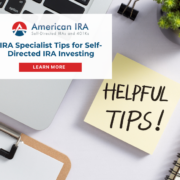What is a Self-Directed IRA for Joint Ventures and Partnerships?
When people think about using a Self-Directed IRA, it is typically with a nontraditional investment in mind. For example, many investors come to Self-Directed IRAs because they know they want to put retirement money into real estate. And that is indeed what a Self-Directed IRA can help do: it can make it possible for investors to put aside retirement money into the nontraditional assets that they may be more familiar with, more comfortable with, or both.
But there are rules as well. One such rule is that an investor cannot use an IRA to transact with disqualified persons. That means personal interactions, such as renting out a piece of real estate to someone you know, would be considered prohibited.
With that in mind, when is it ever possible to use a Self-Directed IRA for joint ventures and partnerships? And how do people do it? Here is what you will need to know.
Why Joint Ventures and Partnerships to Begin With?
Let us start by answering one of the most important questions. Why do investors flock to joint ventures and partnerships in the first place? The simplest answer is that entering a joint venture and partnership can accomplish two things. First, it helps an investor spread out their risk. Rather than taking on 100% of a new project, they may only be footing 50% of the bill. The second is that joint ventures and partnerships can help these partnerships leverage the unique abilities and assets that both parties bring to the table.
Are Joint Ventures and Partnerships Allowed with IRAs?
Considering that you are not allowed to use the contents of a Self-Directed IRA to transact with “disqualified persons”—defined as people with whom you may have a prior relationship, such as a spouse, a relative, or a business partner—how is it possible to use an IRA for any type of joint venture or partnership? But as we say in our “little-known fact” on our Joint Ventures and Partnerships page:
A little-known fact is that your IRA can joint venture and/or partner with you and/or others that would be considered disqualified people so long as this partnership occurs at ‘the time of acquisition’. This is a winning situation that allows you to generate current income and to build your retirement account.
What does this mean exactly? It means you will want to have a good relationship with a Self-Directed IRA administration firm who acts as the custodian of your account. That is because a good Self-Directed IRA administration firm can help alert you to the potential problems that you might risk if you do not administer your Self-Directed IRA properly. This is especially important to keep in mind with joint ventures and partnerships since it can be difficult to see where the boundaries are.
Using Joint Ventures and Partnerships with a Self-Directed IRA
Once you have a better sense of what you can and cannot do with a Self-Directed IRA, you will be pleased to learn about all the possibilities that are present. A joint venture or partnership can allow you to take on less of the risk with a new investment. But it also means that you might have access to the type of investment you typically did not have access to before. For that reason, many people find these worth the homework and due diligence necessary to pull them off. However, a Self-Directed IRA administration firm like American IRA will not tell you where to put your money. As the custodian of the account, they will help administer an account for which you have ultimate responsibility.
Interested in learning more about Self-Directed IRAs? Contact American IRA, LLC at 866-7500-IRA (472) for a free consultation. Download our free guides or visit us online at www.AmericanIRA.com.








